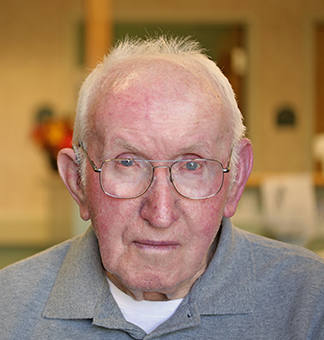
Mr. Sanders, 84
Air Force Veteran (1958 – 1976)
VA patient (30+ years)

Dr. Katz, 45
Physician, Primary Care
VA Medical Center (11 years)
MOTIVATIONS FOR DEPRESCRIBING
Mr. Sanders is an older patient who has several serious medical conditions including cardiovascular disease and diabetes. Because of the complexity of his medical problems, he is seen by multiple specialty clinicians in addition to his primary care physician. He is very invested in understanding the nature of his medical conditions and participating in making treatment decisions.

"I've had two open heart surgeries. I've got two stents and now I have congestive heart failure. In addition, my Type II diabetes evolved into Type I. And I have declining eyesight due to the diabetic complications…. So here we are."
Mr. Sanders
VA Patient

"He is a very 'on top of it' gentleman. He is one of the folks who would measure his blood pressure multiple times a day; and then, bring me three months' worth of data."
Dr. Katz
Primary Care Physician, VA
In the past, Mr. Sanders had experienced episodes of debilitating leg pain, which he felt were due to statins. For several months, he discussed his suspicion with his physicians, but felt that he received no support from his care providers for lowering his statin dose or tapering off the medication, as they felt his heart condition made discontinuing statins too risky.

"Now, to tell you how severe this was, I couldn't walk anymore. I couldn't walk a block without having such severe pain I had to find a bench. It was so severe…that I was investigating scooters."
After conducting research on his own, Mr. Sanders decided to go off of his statins without the guidance of his physician. His leg pain subsided. He felt that stopping statins was worth the risk because of the negative impact they were having on his quality of life.
More recently, Mr. Sanders suspected that his blood pressure medications were responsible for significant bouts of ongoing fatigue. He approached his physicians about this, but in his view, his physicians didn't feel the need to address his concerns. He felt that perhaps each physician (cardiologist, primary care doctor, endocrinologist) felt it was outside of their role and was expecting someone else to address the issue. He started to do more research on his own.

"I began to see a pattern over the years that, you know, I'm chronically low [blood pressure]…but nothing was ever done. So, I was just staggering, finding more information about low blood pressure…and I just began to connect the dots."
In fact, his cardiology team wanted to increase his blood pressure dose to meet recommended blood pressure guidelines for his condition. At the same time, his primary care physician wasn't sure how to proceed, and didn't feel comfortable decreasing or stopping a medication she had not prescribed. Mr. Sanders started doing his own research to see if his medications were the cause.

"Nobody ever connected it with the medications. And once again…through common sense in general…it seems to me that with all the effects of medicine and cross pollination of medications, that, by golly, that ought to be one of the first points of inquiry…It never was done."

"…Cardiology has been working with him to up titrate several of his medications for heart failure. And in the course of that, during that same time period, his blood pressure also started trending pretty low, and he started reporting in visits more often that he was feeling pretty fatigued. But he wasn't necessarily endorsing classic symptoms of hypotension, like feeling lightheaded or passing out…it didn't quite add up."
CHALLENGES OF COORDINATING CARE
When multiple clinicians are involved, each one is typically focused on a different set of medical problems. In these situations, it can be difficult for one clinician to make decisions about medications that are prescribed by another. Clinicians often do not feel empowered to question or make changes in another clinician's regimen; or even if they do, barriers to efficient communication between clinicians can hinder coordination of efforts.

"As a general practitioner in this situation, I didn't necessarily feel empowered to make changes to those medications that I wasn't prescribing myself or directing… Plus, I also sort of think, well, cardiology knows what they're doing. They're the sub-specialist. So, if they think this is what's best, then we'll do that."

"[A medication review] for some patients could basically take the entire visit, and so to take the next step of looking at the medication list and the patient's goals and preferences, and all of that as a whole would have to probably be a second visit…The other challenge that I'm thinking of is that some patients receive care within the VA but also outside the VA. So if they have a non-VA provider who is prescribing some medications, then in our visits we ask about all of those medications. But we don't have direct control. And sometimes, we don't have easy access to documentation from the other provider about those medications.
Unfortunately, deficits in communication and care coordination can lead to a patient simply feeling unheard. Patient perceptions, like those of Mr. Sanders', can lead to risky behaviors such as choosing to modify doses or stop taking medications on their own.

"…You know, I'm talking all of these [medications] and nobody has ever really talked about the interaction of these things…I'm in four or five specialty clinics - and every physician I would ask, 'Is there any possibility?' They'd say, 'Well, yeah, perhaps.' They never would investigate it…If it didn't sharply fall into their purview they just, 'Well, yeah, it could be…' They would go back to their particular focus. Very frustrating…"
Over time, Mr. Sanders was able to convince his cardiologist that he should be able to try to taper off of his blood pressure medications. A cardiology clinical pharmacist was brought in to help him come off his blood pressure medication.

"Almost overnight…I got more energy…It was wonderful. The average blood pressure read for me now is [in] a healthy range. So, it's a miracle. Well, why is it a miracle? Because I demanded that the doctors just use intuition, and I'd be at a loss to say they have no common sense, but damn, use common sense. Drives me crazy."

"I think that back in October when his blood pressure had already been running low for probably many months, I think it would have been smoother if I had reached out to cardiology then, just to put it on their radar that this was a concern of his. That may have helped with the conversation… It's always a difficult balance…working with a sub-specialist because I don't want to undermine a sub-specialist in conversations with the patient and sort of have the patient lose confidence in any of his care team."

"I remember at a follow up visit that we had that he expressed frustration, not just with cardiology but I think with medicine in general, that providers would look at his medication list and think about the disease process and try to match the medications, but not look at him as an individual."

"…If we followed all of the guidelines for all of the diseases processes for every patient, it would basically be unsustainable, unmanageable because of the potential for drug to drug interaction, side effects, all of that kind of thing. …When you put it in terms of a person, it can be really hard to sort out what's going to work and not work for this person. And where am I going to let go of the guideline and bring in the patient's preferences and goals and all of that."
In this case, Mr. Sanders' self-advocacy led to a successful deprescribing effort. Although he was somewhat anxious during the process of decreasing his antihypertensive medication, his blood pressure now remains in an appropriate range, and he reports an improvement in his energy level.















